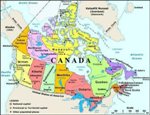Canadian software developer found guilty in terrorist plot
 Montreal - A Canadian software developer was found guilty of terrorism charges Wednesday in a foiled trans-Atlantic plot to bomb nightclubs, railway stations and subways in Britain.
Montreal - A Canadian software developer was found guilty of terrorism charges Wednesday in a foiled trans-Atlantic plot to bomb nightclubs, railway stations and subways in Britain.
Momin Khawaja, a former contract employee of Canada's Foreign Affairs Department, was found guilty of several counts under the Anti-Terrorism Act in the first major test of the controversial legislation rushed into law after the September 11, 2001 attacks in the United States.
Judge Douglas Rutherford of the Ontario Superior Court convicted Khawaja, 29, on five charges of financing and facilitating terrorism for providing cash to a group of British radicals, offering them lodging and other assistance, and undergoing training at a terrorist camp in Pakistan.
Rutherford also found Khawaja, who had professed his admiration for Osama bin Laden, guilty of two criminal offences related to building a remote-control bomb trigger, known as the Hi-Fi Digimonster.
"I found you guilty as charged," Rutherford told an impassive Khawaja, who stood shackled behind bullet-proof glass in the tightly guarded courtroom.
But he acquitted Khawaja of terrorism offences with regard to the Digimonster, saying there was not sufficient proof Khawaja knew it was to be used in fertilizer-bomb attacks in London.
"He was acquitted of the London bombing ... It's terrific. It was what we set out to do," Khawaja's defense lawyer Lawrence Greenspon told reporters. He said the other five charges were "far less serious."
British police disrupted the plot to blow up soft targets in and around London using 600 kilograms of ammonium nitrate fertilizer and arrested five Islamic extremists. Khawaja, who had pleaded not guilty to all charges, was accused of building and supplying the detonators for those bombs in the basement of his Ottawa house.
Khawaja has been held in prison in Ottawa since 2004. He will be sentenced on November 18 and faces the possibility of life in prison. All five British men were sentenced to life last year. Canada's anti-terror law gives the government broad powers to withhold intelligence information on national security grounds. (dpa)